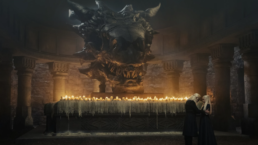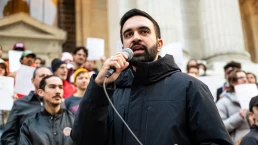HBO’s new ‘Game of Thrones’ series is a meditation on governing, politics, and how weapons of mass destruction are — or should be — constrained.
By Maureen Ryan, Outrider
House of the Dragon asks a compelling question: If you had the ultimate weapon, could you rule in a relatively untroubled way forever?

In the fictional Westeros, dragons are the ultimate power, as wielded by ruling the Targaryen clan. But even they know their grip on the world order is tenuous.
“The idea that we control the dragons is an illusion,” King Viserys Targaryen tells his daughter in the first episode. “They are a power man should never have trifled with.”
Sunday’s episode introduces even more political instability, with a young royal, Aemond, swiping a dragon out from under another powerful clan. This plot twist adds yet another wild card to an extremely tense situation in Westeros and serves as something of a reminder of the dangerous number of nuclear weapons that have been lost, including at least three by the U.S. alone.
Of course, dragons aren’t perfect analogues for nuclear weapons; but in a medieval-ish world of swords, clubs, and crossbows, dragons are the mic drops of weapons.
When the original Game of Thrones series aired from 2011-2019, the political landscape was different. Though U.S. President Donald Trump threatened North Korea with “fire and fury” as nuclear tension escalated, it passed as dangerous rhetoric. Since then, Russian president Vladimir Putin has invaded Ukraine, threatening the world with the dragons of his own atomic arsenal through nuclear blackmail.
“No matter who tries to stand in our way,” Putin said in February, “they must know that Russia will respond immediately, and the consequences will be such as you have never seen in your entire history.”
Recent Posts
Politicians Are Betraying Gen Z On Climate
July 10, 2025
Take Action Now While Gen-Zers thrift, knit, crochet, and find other ways to reduce our footprints, Trump and the GOP are greenlighting more climate…
Trump’s Deportation Threat Against Zohran Mamdani Is Shameful
July 10, 2025
Take Action Now In only half a year of Donald Trump’s presidency, he and his allies have turned deportation into an explicitly political threat…
Teachers Union Votes To Cut Ties To The Anti-Defamation League
July 10, 2025
Take Action Now In a momentous vote, the National Education Association voted to cut all ties with the Anti-Defamation League. The reason? “Despite…
2025 War Abolisher Awards Go To Albanese, Nader, Waters
July 9, 2025
Take Action Now The purpose of the awards is to honor and encourage support for those working to abolish the institution of war itself.By World…




